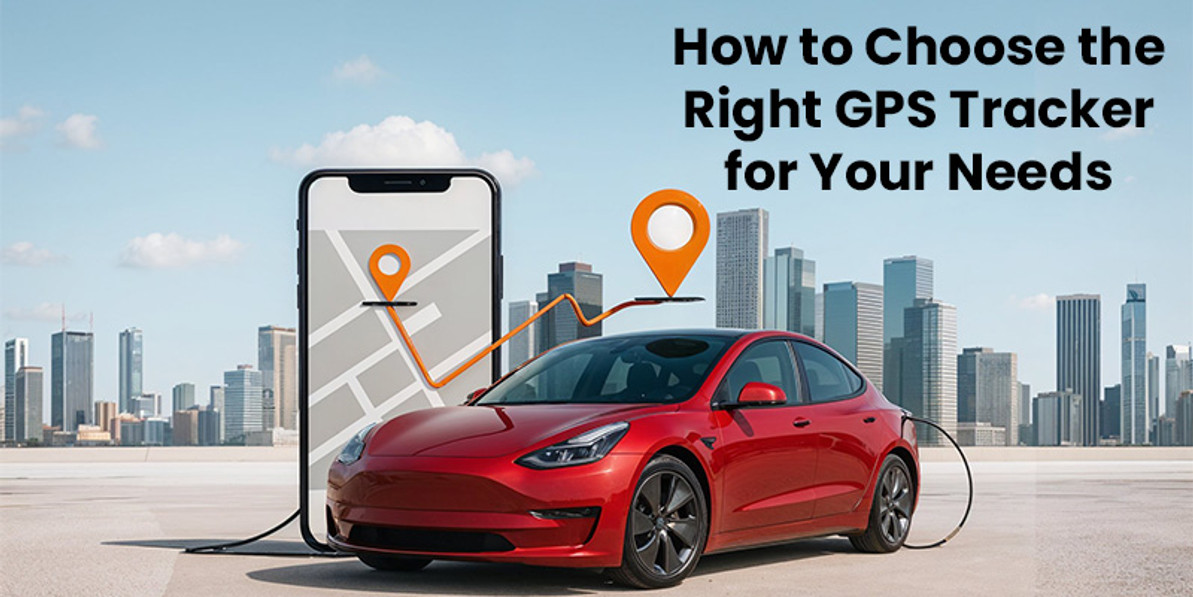How to Choose the Right GPS Tracker for Your Needs
How do you ensure your car, trailer, or heavy equipment stays secure and easily located? In today’s world, where security and efficiency are top priorities, GPS trackers have become indispensable tools for personal and business use. Whether safeguarding your assets or managing a fleet of vehicles, a GPS tracker offers a level of control and peace of mind that was once unimaginable.
For businesses, GPS tracking devices can improve operational efficiency by allowing for real-time monitoring of assets, vehicles, and even employees. Individuals can also benefit by keeping track of their belongings, ensuring they never lose sight of valuable items like cars, trailers, or boats.
But how do you choose the right GPS tracker for your needs? With so many options available, including small GPS trackers for personal use, OBD GPS trackers for vehicles, and specialized GPS tracking devices for trailers, it can be overwhelming to make the right decision. This article will guide you through the process, helping you select the perfect GPS tracker based on your specific requirements—whether for a car, trailer, or construction equipment.
What is a GPS Tracker?
A GPS tracker functions based on the Global Positioning System (GPS) to pinpoint the location of an object, vehicle, or person in real time. It communicates with satellites orbiting Earth to determine its precise location through signals from GPS satellites. This technology enables tracking of any movement, whether you're monitoring a car, trailer, or valuable equipment. The GPS tracker receives signals from satellites and triangulates the position to provide accurate, real-time location data.
GPS technology depends on a network of satellites that continuously broadcast signals. The GPS tracker receives these signals, and with the help of onboard technology, it calculates the position, speed, and direction of the object it's attached to. This information is then sent to a tracking platform or app, which can be monitored live. Whether used for personal or business purposes, a GPS tracker offers unparalleled control, security, and peace of mind.
Types of GPS Trackers
Various GPS trackers are designed for different purposes, from personal security to asset protection and fleet management. Here are some of the key types:
- Small GPS Tracker: Ideal for tracking personal items or valuables, offering portability and ease of use.
- OBD GPS Tracker: A device plugs into a car's OBD II port to provide real-time tracking and vehicle diagnostics.
- GPS Tracking Device for Trailer: Specifically designed to monitor the location of trailers, ensuring they are always within reach.
- GPS Tracker for Equipment: Designed to track high-value equipment used in construction or other industries.
- Trailer GPS Tracking Systems: Provide real-time monitoring of trailers, improving security and helping to manage logistics.
- Cars with GPS Trackers: These trackers offer vehicle security and allow owners to monitor their location, speed, and movement.
Each type is suited for specific needs, ensuring you have the right tool for the job, whether tracking a vehicle, equipment, or trailer.
Factors to Consider When Selecting the Correct GPS Tracker
Several factors must be considered when selecting a GPS tracker to ensure it meets your specific needs. Each element is vital in determining the device's effectiveness, from the purpose of use to the power source and coverage. Let’s take a closer look at key considerations.
Cars with a GPS Tracker
![]()
A GPS tracker for cars provides improved security by enabling owners to monitor their vehicle’s location in real-time. This is especially useful for tracking stolen cars, ensuring quick recovery, and providing peace of mind. In addition to security, these devices can monitor driving behavior and vehicle health, sending alerts for maintenance needs. For those seeking comprehensive car management, cars with GPS trackers are indispensable.
GPS Tracker for Rental Equipment
A GPS tracker is essential for businesses in the rental equipment industry to protect high-value assets. These trackers help ensure that rented equipment is secured and easily located in case of theft or misplacement. Additionally, they provide valuable insights into equipment usage and location, assisting businesses in streamlining operations, optimizing asset utilization, and reducing costs by preventing losses and unauthorized use.
GPS Tracker for Construction Equipment
Construction equipment is often exposed to harsh environments and is vulnerable to theft. A GPS tracker for construction equipment helps managers safeguard valuable machinery by providing real-time tracking information. This deters theft and allows construction teams to monitor equipment location and usage, improving operational efficiency and asset management on large construction sites. It’s an innovative solution for long-term security.
GPS Trailer Tracking
Trailers are often used for transporting goods over long distances, making them prime targets for theft. A GPS tracking device for trailers offers specialized monitoring, providing real-time data on location and movement. This added security allows businesses to track trailers, prevent unauthorized use, and streamline logistics, ensuring that trailers are always where they need to be. GPS trailer tracking systems are invaluable for transportation companies.
GPS Tracking for Heavy Equipment
Tracking heavy equipment presents unique challenges due to its scale and often remote locations. GPS tracking for heavy equipment is critical for construction companies and large enterprises managing high-value machinery. With real-time updates and geofencing capabilities, managers can ensure that equipment operates within designated zones, track fuel consumption, and monitor for unauthorized movement or theft.
Battery Life and Power Source
The power source for a GPS tracker determines its longevity and reliability. Some models require a battery, while others are rechargeable or hardwired into vehicles or equipment. A rechargeable GPS tracker may be more convenient, but battery-operated models are ideal for longer-term tracking where frequent charging is not an option. Consider whether the tracker needs a constant power source and select the best fit for your use case.
GPS Satellite Tracker
GPS satellite trackers are often the best option for extended battery life and reliable coverage in remote areas. These trackers utilize satellite communication to maintain constant connectivity, even in locations with limited cellular network access. As a result, they provide greater accuracy and more consistent coverage, making them ideal for monitoring assets in rural or remote areas where other GPS devices may struggle.
Accuracy and Coverage
Reliable tracking is essential for making informed decisions regarding asset management and security. GPS trackers offer varying degrees of accuracy and coverage, so choosing one that suits your needs is critical. With the integration of satellite technology, GPS satellite trackers provide better coverage, especially in remote areas. Additionally, geofencing and real-time updates help ensure that the tracker’s information is always accurate, improving the overall reliability of your asset management system.
GPS Tracker Features to Look For
![]()
When choosing a GPS tracker, evaluating the features that best align with your needs is essential. The right GPS tracker should offer accuracy, reliability, and a range of functionalities that enhance functionality, security, and cost-effectiveness. Let’s explore features to consider when selecting a GPS tracker.
Geofencing Capabilities
A Geofence GPS tracker allows you to set virtual boundaries around specific locations. When a vehicle or asset crosses these boundaries, you receive an alert, which can be vital for security purposes. This feature is handy for fleet management, ensuring vehicles or trailers remain within designated zones. Geofencing helps businesses monitor routes and prevent unauthorized movement, offering peace of mind and improved asset control.
Real-Time Tracking and Alerts
Real-time tracking and alerts are crucial for receiving immediate updates about your assets' location, speed, or movement. This feature is especially valuable for GPS tracking devices for trailers and cars with GPS trackers. By getting real-time information, users can act quickly in case of theft or unauthorized movement. Alerts can be sent through messages, email, or app notifications, ensuring that the right people are always in the loop about asset status.
Durability and Weather Resistance
Durability must be considered when selecting a GPS tracker for heavy equipment. These trackers must withstand harsh outdoor environments and extreme weather conditions. Whether rain, snow, or dust, rugged and weather-resistant GPS trackers ensure that your equipment is always tracked accurately, no matter the conditions. This feature is significant for construction or agricultural equipment operating in harsh environments.
Ease of Use and Integration
User-friendly installation is another essential factor to consider. Many GPS tracking devices, including those for trailers and cars with GPS trackers, offer simple installation processes. Some devices can be plugged into an OBD-II port, while others require minimal wiring. Additionally, the tracker must integrate smoothly with mobile apps and fleet management software, making it easier for businesses and individuals to monitor assets, set alerts, and view reports from their smartphones or computers.
Cost vs. Features
Balancing cost and features is crucial when choosing a GPS tracker. For businesses tracking multiple assets or vehicles, finding a GPS tracking system that fits within the budget while offering essential features like real-time tracking, geofencing, and weather resistance is key. While more expensive models have advanced functionalities, consider your fleet's or equipment's unique needs and choose a tracker that provides the best value without overspending on unnecessary features.
How to Install and Use a GPS Tracker
Installing and correctly using a GPS tracker is crucial for optimal performance. Whether you’re tracking a car, motorcycle, trailer, or equipment, following the proper steps during installation and effectively understanding the device’s use can make all the difference. Let's go through the process, from installation to monitoring, so that you can get the most out of your GPS tracker.
Step-by-Step Installation Guide
Installing a GPS tracking device is relatively simple, but one must follow the instructions provided by the manufacturer for proper placement and connection.
- The device typically plugs into the OBD-II port or can be installed with basic wiring for vehicles like cars or motorcycles.
- When installing a GPS tracker for equipment or trailers, ensure the device is securely attached to a hidden, hard-to-remove location.
- Optimal performance depends on selecting the correct placement—choose spots that avoid obstructions and provide a clear signal to GPS satellites. For example, for cars, installing a GPS trailer tracking device near the windshield or under the vehicle can improve reception.
Using the GPS Tracker
Once your GPS tracker is installed, using it is straightforward. Most GPS trackers come with mobile apps or web platforms where you can monitor your assets in real-time. These platforms provide location updates, speed reports, and the ability to set up geofence GPS tracker alerts, notifying you whenever your vehicle or equipment enters or leaves designated areas. Regularly check your app for updates and set your tracker to receive notifications for movements or status changes. This allows you to stay informed about your tracked items at all times.
How to Locate a GPS Tracker on Your Car
If your GPS tracker becomes misplaced or tampered with, it’s essential to know how to locate it. For cars, GPS trackers are usually placed under the dashboard, near the windshield, or in hidden compartments. If you can’t find it, check areas that may have been disturbed or removed, such as the OBD-II port or fuse box. Also, using the tracking app or web platform to pinpoint the last known location can help guide your search. Regularly check the tracker’s placement to ensure it remains secure and operational.
Choosing GPS Trackers for Specific Needs
![]()
Selecting the right GPS tracker depends heavily on the intended use, whether personal or business-related. Different applications require specific features and functionalities to ensure effectiveness. Let's break down the best GPS tracking solutions for various needs, from individual vehicles to business operations involving fleets, construction equipment, and rental businesses.
Personal Use
GPS trackers provide added security and peace of mind for personal vehicles like cars and motorcycles. A GPS tracker for cars allows you to monitor the vehicle’s location, helping to recover a stolen car quickly. Additionally, a small GPS tracker for motorcycles offers the same benefits in a compact, easy-to-hide form. When choosing a tracker, consider real-time tracking, geofence GPS tracker capabilities, and battery life to ensure reliable monitoring and timely alerts.
Business Use
For businesses managing fleets, a GPS trailer tracking system is essential. These devices offer real-time monitoring of trailers, preventing theft and ensuring assets are where they should be. GPS tracking for heavy equipment helps businesses manage machinery, track fuel usage, and optimize equipment maintenance schedules. GPS trackers for construction equipment and GPS trackers for heavy equipment provide robust solutions for safeguarding assets and improving overall fleet management efficiency.
Rental Businesses
In the rental industry, tracking equipment is crucial to prevent theft and damage. A GPS tracker for rental equipment helps rental businesses monitor their high-value assets' precise location and usage. Companies can set up virtual boundaries using a geofence GPS tracker and receive instant alerts if the equipment is moved outside the designated area. This protects assets and ensures better management and customer accountability in rental operations.
Common Challenges and How to Overcome Them
While GPS trackers provide numerous benefits, users may face some common challenges. From signal interference to battery life management and installation issues, it’s essential to be aware of these potential hurdles and know how to address them. Let’s learn about these challenges and discuss practical solutions.
Signal Interference and Coverage
One of the key challenges with GPS satellite trackers is signal interference, particularly in remote or densely built areas. Thick trees, tall buildings, or tunnels can block GPS signals, leading to inaccurate tracking or loss of signal altogether. To overcome this, ensure the GPS tracker is designed to work in areas with weak coverage. Some GPS satellite trackers have advanced signal processing features that improve performance even in harsh environments. Choosing a tracker with strong satellite coverage is crucial, especially when tracking valuable equipment or vehicles in remote locations.
Battery Life Concerns
Managing battery life is crucial, especially for long-term use of devices like an OBD or GPS tracker for equipment. To extend battery life, choose models with power-saving features, like motion detection or low-power modes. Regularly checking the battery status and charging devices when necessary helps prevent unexpected outages. Some devices also offer external power sources or are hardwired into vehicles, making them ideal for continuous use without worrying about battery drain. Ensuring proper power management will keep your GPS tracker running smoothly over time.
Installation Issues
Installation of GPS trackers can sometimes be tricky, especially for users unfamiliar with the process. Common mistakes include improper placement or incorrect connections, leading to malfunctioning devices. To avoid these issues, always follow the manufacturer's installation instructions carefully. When installing a GPS tracking device for equipment or vehicles, ensure the tracker is placed in a location with clear access to GPS satellites. For OBD GPS trackers, simply plug the device into the OBD-II port, ensuring it's securely connected. Proper installation ensures reliable performance and accurate tracking.
Other GPS Products Available at Tracker Systems
In addition to a wide range of GPS trackers, Tracker Systems offers various related products that cater to different tracking needs. Whether you’re managing a fleet of vehicles, securing trailers, or tracking equipment, these products are designed to ensure efficient monitoring and security. Here are some of the key offerings:
- GPS Trailer Tracking Systems: These systems provide real-time location updates for trailers, ensuring they are always secure and easy to locate, preventing theft or unauthorized movement.
- GPS Tracking Device for Trailer: A specialized tracker that monitors trailers, providing valuable insights into location, speed, and status, with added features like geofencing for improved security.
- OBD GPS Trackers: Ideal for personal and fleet vehicles, OBD GPS trackers provide instant access to vehicle data and real-time location tracking. These trackers are easy to install and require no complicated wiring.
- GPS Tracker for Heavy Equipment: Specifically built for monitoring large machinery, these devices offer rugged durability and precise location tracking, even in remote locations.
- GPS Asset Tracking Devices: These trackers are designed for use with high-value assets, providing real-time monitoring to ensure their safety and security.
Tracker Systems’ products cater to personal and business needs, offering innovative solutions for real-time tracking, asset protection, and fleet management.
Customer Support and Additional Resources
Tracker Systems offers comprehensive support to help customers choose and install the best GPS trackers. Their website offers different resources, including installation guides, FAQs, and troubleshooting tips to streamline the setup process. For more specialized help, customers can contact the customer service team through email or the telephone for personalized assistance. Whether you need help selecting the right product or guidance on how to install a GPS tracking device, Tracker Systems provides the resources and expertise to support your needs.
Wrapping Up
Choosing the right GPS tracker is crucial for ensuring the security, efficiency, and management of your assets, vehicles, or equipment. Whether looking for a GPS tracker for cars, motorcycles, trailers, or heavy equipment, selecting the appropriate device can provide peace of mind and practical benefits. A reliable GPS tracker helps prevent theft, optimize fleet management, and ensure the safety of high-value items. With features like real-time tracking, geofencing, and easy integration with mobile apps, you can monitor your assets at all times, receive instant alerts, and improve operational efficiency. By understanding your specific needs—whether for personal use, business, or fleet management—you can make an informed choice that solves key problems such as security, asset monitoring, and operational management. Ultimately, the right GPS tracker offers convenience and improved control over your valuable assets, making it a must-have tool for personal and business use.
Recent Posts
-
How to Choose Between a standalone GPS tracker and a GPS phone app
You’re trying to track something important, and the options feel deceptively simple. Do you buy a de …Jan 23rd 2026 -
The Pros and Cons of GPS Trackers with Real-Time Tracking
Real-time tracking in vehicle and asset monitoring means the location of a car, truck, or piece of e …Jan 16th 2026 -
Using GPS Trackers to Monitor Employee Performance
Field teams, drivers, and mobile crews are often the face of your business. They meet customers, del …Jan 5th 2026



